Roberts A.D. The Cambridge History of Africa, Volume 7: from 1905 to 1940
Подождите немного. Документ загружается.

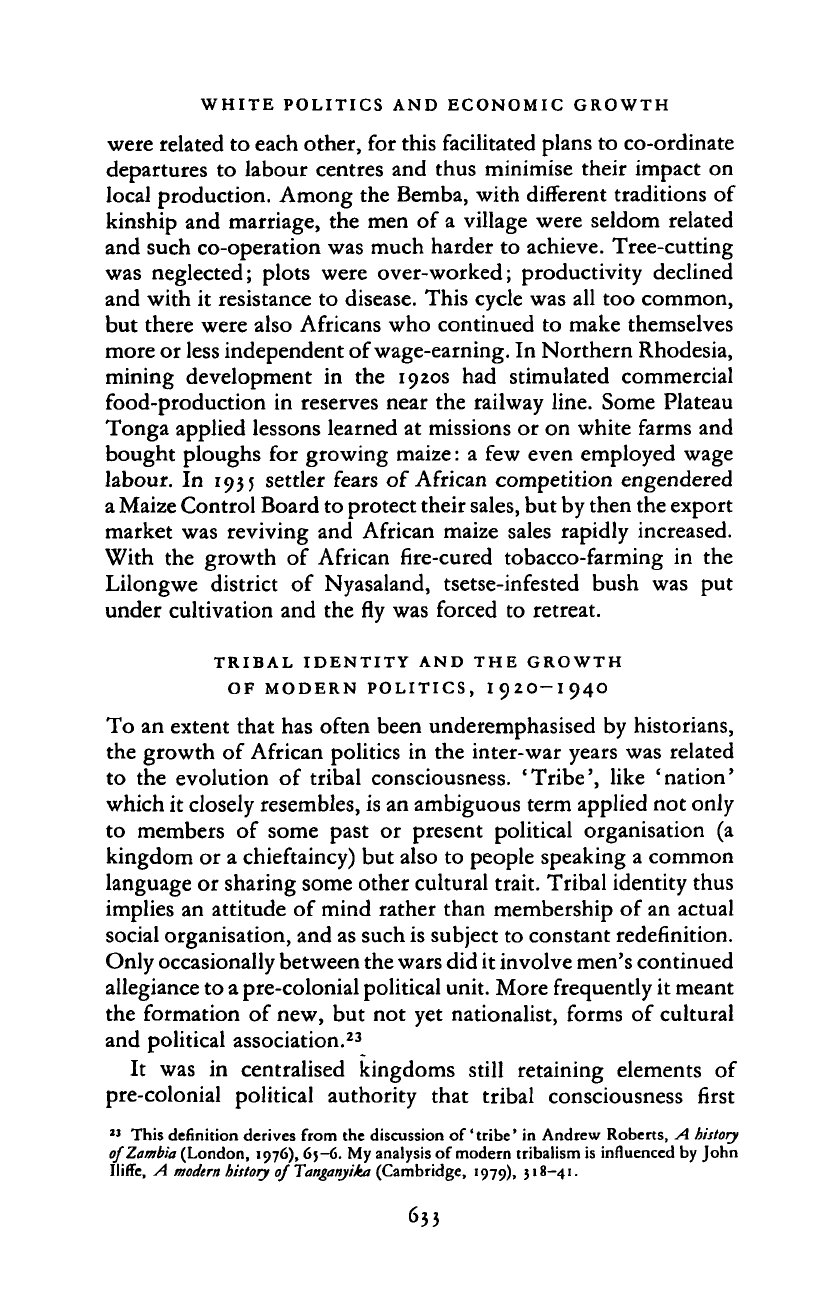
WHITE POLITICS AND ECONOMIC GROWTH
were related to each other, for this facilitated plans to co-ordinate
departures to labour centres and thus minimise their impact on
local production. Among the Bemba, with different traditions of
kinship and marriage, the men of a village were seldom related
and such co-operation was much harder to achieve. Tree-cutting
was neglected; plots were over-worked; productivity declined
and with it resistance to disease. This cycle was all too common,
but there were also Africans who continued to make themselves
more or less independent of wage-earning. In Northern Rhodesia,
mining development in the 1920s had stimulated commercial
food-production in reserves near the railway line. Some Plateau
Tonga applied lessons learned at missions or on white farms and
bought ploughs for growing maize: a few even employed wage
labour. In 1935 settler fears of African competition engendered
a Maize Control Board to protect their
sales,
but by then the export
market was reviving and African maize sales rapidly increased.
With the growth of African fire-cured tobacco-farming in the
Lilongwe district of Nyasaland, tsetse-infested bush was put
under cultivation and the fly was forced to retreat.
TRIBAL IDENTITY AND THE GROWTH
OF MODERN POLITICS, I92O-194O
To an extent that has often been underemphasised by historians,
the growth of African politics in the inter-war years was related
to the evolution of tribal consciousness. 'Tribe', like 'nation'
which it closely resembles, is an ambiguous term applied not only
to members of some past or present political organisation (a
kingdom or a chieftaincy) but also to people speaking a common
language or sharing some other cultural trait. Tribal identity thus
implies an attitude of mind rather than membership of an actual
social organisation, and as such is subject to constant redefinition.
Only occasionally between the wars did it involve men's continued
allegiance to
a
pre-colonial political unit. More frequently it meant
the formation of new, but not yet nationalist, forms of cultural
and political association.
23
It was in centralised kingdoms still retaining elements of
pre-colonial political authority that tribal consciousness first
" This definition derives from the discussion of 'tribe* in Andrew Roberts, A history
of Zambia (London, 1976), 6j-6. My analysis of modern tribalism is influenced by John
Iliffe, A
modern
history of
Tanganyika
(Cambridge, 1979), 318-41.
633
Cambridge Histories Online © Cambridge University Press, 2008
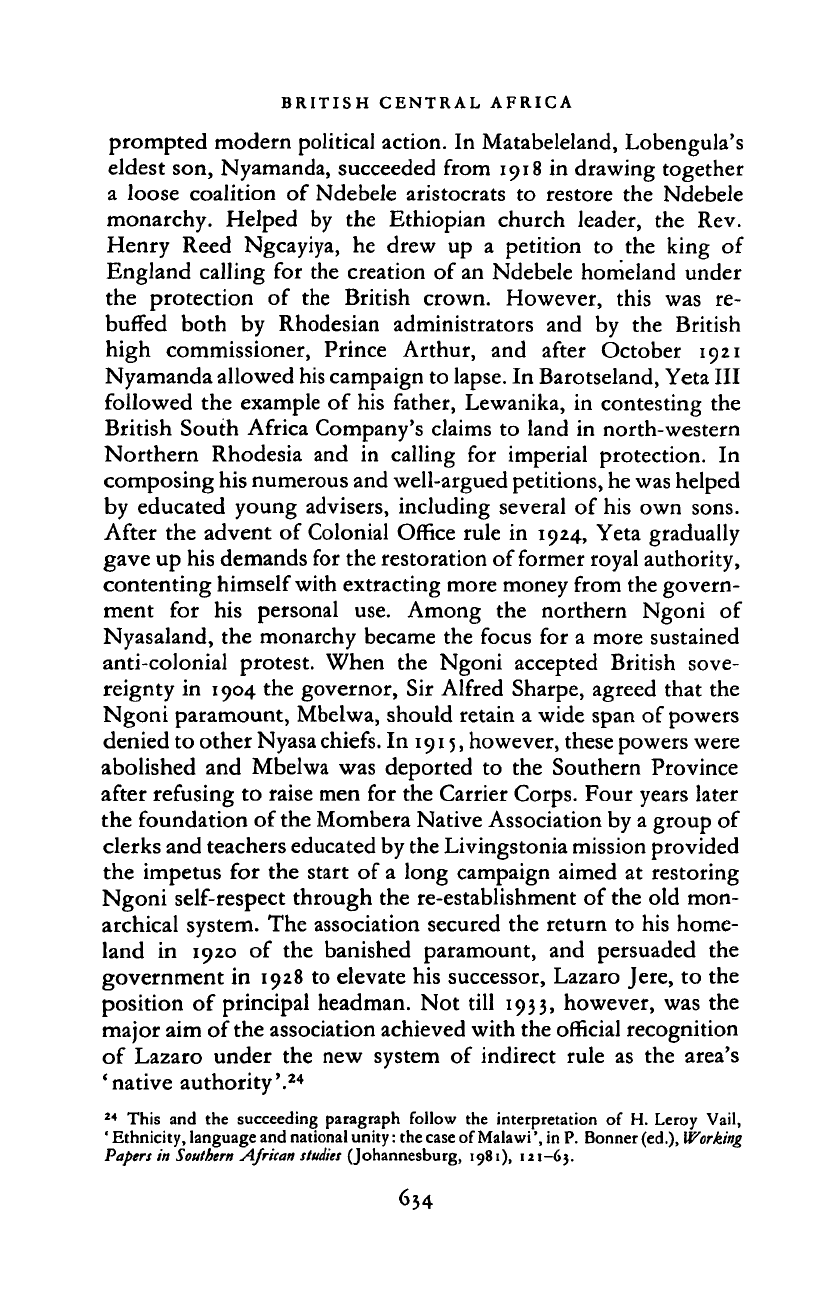
BRITISH CENTRAL AFRICA
prompted modern political action. In Matabeleland, Lobengula's
eldest son, Nyamanda, succeeded from 1918 in drawing together
a loose coalition of Ndebele aristocrats to restore the Ndebele
monarchy. Helped by the Ethiopian church leader, the Rev.
Henry Reed Ngcayiya, he drew up a petition to the king of
England calling for the creation of an Ndebele homeland under
the protection of the British crown. However, this was re-
buffed both by Rhodesian administrators and by the British
high commissioner, Prince Arthur, and after October 1921
Nyamanda allowed his campaign to lapse. In Barotseland, Yeta III
followed the example of his father, Lewanika, in contesting the
British South Africa Company's claims to land in north-western
Northern Rhodesia and in calling for imperial protection. In
composing his numerous and well-argued petitions, he was helped
by educated young advisers, including several of his own sons.
After the advent of Colonial Office rule in 1924, Yeta gradually
gave up his demands for the restoration of former royal authority,
contenting himself with extracting more money from the govern-
ment for his personal use. Among the northern Ngoni of
Nyasaland, the monarchy became the focus for a more sustained
anti-colonial protest. When the Ngoni accepted British sove-
reignty in 1904 the governor, Sir Alfred Sharpe, agreed that the
Ngoni paramount, Mbelwa, should retain a wide span of powers
denied to other Nyasa chiefs. In
1915,
however, these powers were
abolished and Mbelwa was deported to the Southern Province
after refusing to raise men for the Carrier Corps. Four years later
the foundation of the Mombera Native Association by a group of
clerks and teachers educated by the Livingstonia mission provided
the impetus for the start of a long campaign aimed at restoring
Ngoni self-respect through the re-establishment of the old mon-
archical system. The association secured the return to his home-
land in 1920 of the banished paramount, and persuaded the
government in 1928 to elevate his successor, Lazaro Jere, to the
position of principal headman. Not till 1933, however, was the
major aim of the association achieved with the official recognition
of Lazaro under the new system of indirect rule as the area's
'native authority'.
24
24
This and the succeeding paragraph follow the interpretation of H. Leroy Vail,
' Ethnicity, language
and
national unity: the case of Malawi', in P. Bonner
(ed.),
Working
Papers in Southern
African
studies
(Johannesburg, 1981), m-6j.
634
Cambridge Histories Online © Cambridge University Press, 2008
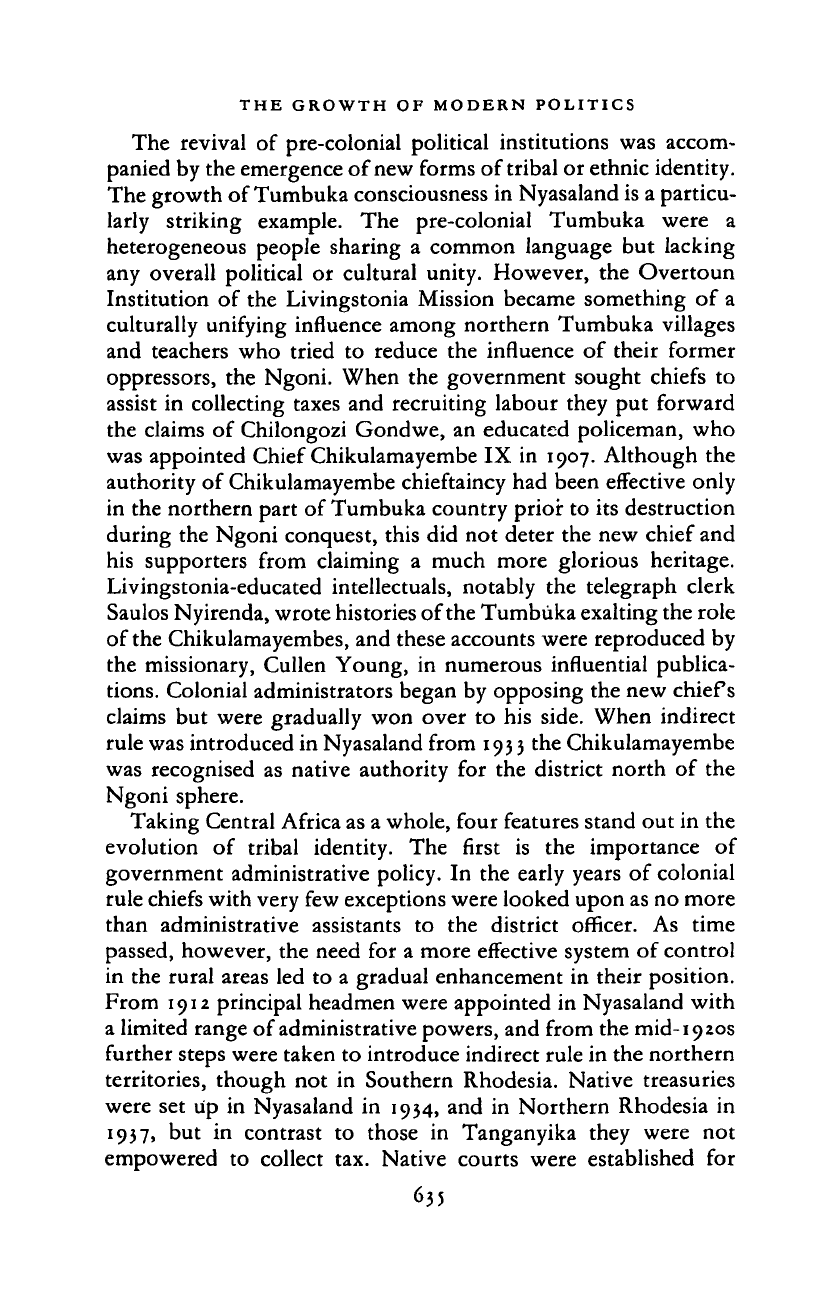
THE GROWTH OF MODERN POLITICS
The revival
of
pre-colonial political institutions was accom-
panied by the emergence of new forms of tribal or ethnic identity.
The growth of Tumbuka consciousness in Nyasaland is a particu-
larly striking example.
The
pre-colonial Tumbuka were
a
heterogeneous people sharing
a
common language but lacking
any overall political
or
cultural unity. However, the Overtoun
Institution
of
the Livingstonia Mission became something
of
a
culturally unifying influence among northern Tumbuka villages
and teachers who tried
to
reduce the influence
of
their former
oppressors, the Ngoni. When the government sought chiefs
to
assist in collecting taxes and recruiting labour they put forward
the claims of Chilongozi Gondwe, an educated policeman, who
was appointed Chief Chikulamayembe IX in 1907. Although the
authority of Chikulamayembe chieftaincy had been effective only
in the northern part of Tumbuka country prior to its destruction
during the Ngoni conquest, this did not deter the new chief and
his supporters from claiming
a
much more glorious heritage.
Livingstonia-educated intellectuals, notably the telegraph clerk
Saulos Nyirenda, wrote histories of the Tumbuka exalting the role
of the Chikulamayembes, and these accounts were reproduced by
the missionary, Cullen Young,
in
numerous influential publica-
tions.
Colonial administrators began by opposing the new chiefs
claims but were gradually won over
to
his side. When indirect
rule was introduced in Nyasaland from 1933 the Chikulamayembe
was recognised as native authority
for
the district north
of
the
Ngoni sphere.
Taking Central Africa as a whole, four features stand out in the
evolution
of
tribal identity.
The
first
is the
importance
of
government administrative policy.
In
the early years of colonial
rule chiefs with very few exceptions were looked upon as no more
than administrative assistants
to the
district officer.
As
time
passed, however, the need for a more effective system of control
in the rural areas led to a gradual enhancement in their position.
From 1912 principal headmen were appointed in Nyasaland with
a limited range of administrative powers, and from the mid-19 20s
further steps were taken to introduce indirect rule in the northern
territories, though not
in
Southern Rhodesia. Native treasuries
were set up
in
Nyasaland
in
1934, and
in
Northern Rhodesia
in
1937,
but in
contrast
to
those
in
Tanganyika they were
not
empowered
to
collect tax. Native courts were established
for
635
Cambridge Histories Online © Cambridge University Press, 2008
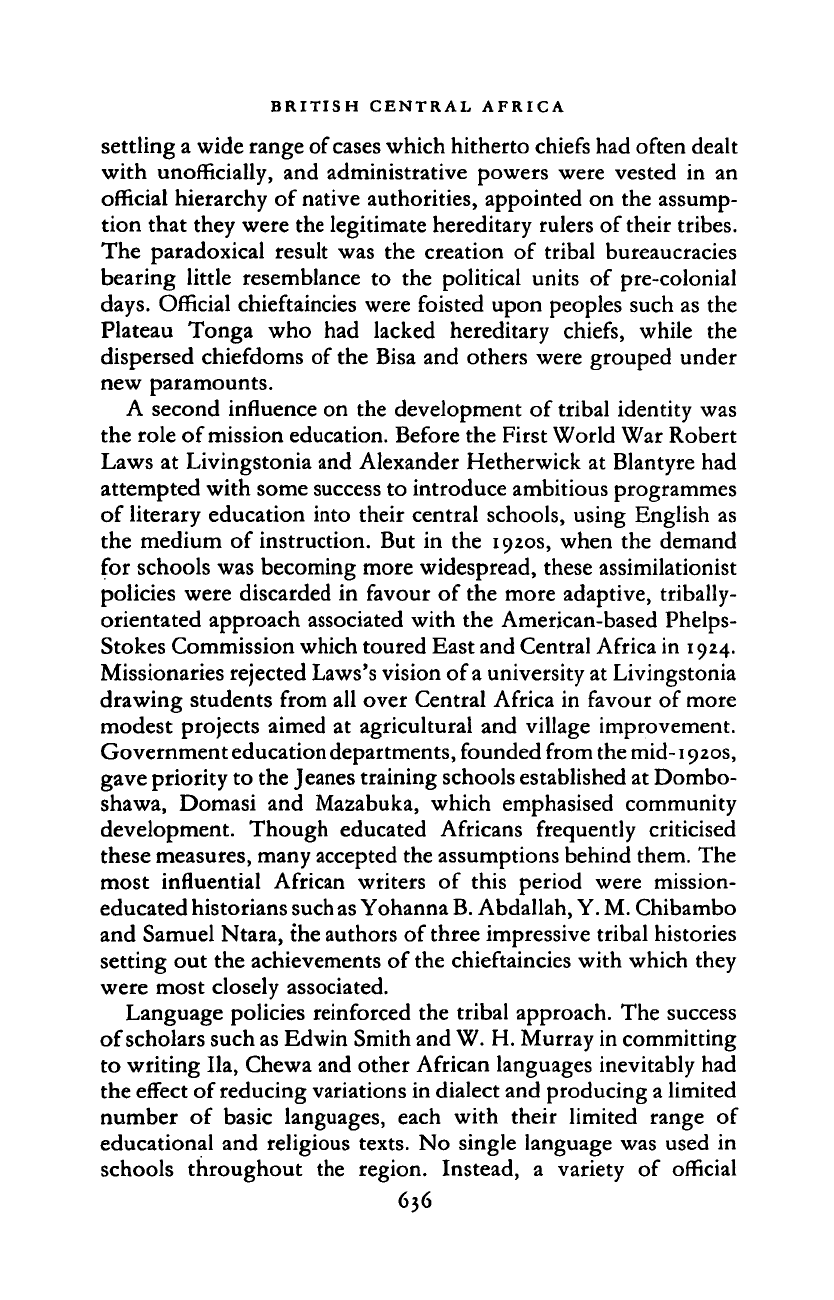
BRITISH CENTRAL AFRICA
settling a wide range of cases which hitherto chiefs had often dealt
with unofficially, and administrative powers were vested
in an
official hierarchy of native authorities, appointed on the assump-
tion that they were the legitimate hereditary rulers of their tribes.
The paradoxical result was the creation
of
tribal bureaucracies
bearing little resemblance
to
the political units
of
pre-colonial
days.
Official chieftaincies were foisted upon peoples such as the
Plateau Tonga who had lacked hereditary chiefs, while
the
dispersed chiefdoms of the Bisa and others were grouped under
new paramounts.
A second influence on the development of tribal identity was
the role of mission education. Before the First World War Robert
Laws at Livingstonia and Alexander Hetherwick at Blantyre had
attempted with some success to introduce ambitious programmes
of literary education into their central schools, using English as
the medium of instruction. But in the 1920s, when the demand
for schools was becoming more widespread, these assimilationist
policies were discarded in favour of the more adaptive, tribally-
orientated approach associated with the American-based Phelps-
Stokes Commission which toured East and Central Africa in 1924.
Missionaries rejected Laws's vision of a university at Livingstonia
drawing students from all over Central Africa in favour of more
modest projects aimed at agricultural and village improvement.
Government education departments, founded from the mid-1920s,
gave priority to the Jeanes training schools established at Dombo-
shawa, Domasi and Mazabuka, which emphasised community
development. Though educated Africans frequently criticised
these measures, many accepted the assumptions behind them. The
most influential African writers
of
this period were mission-
educated historians such
as
Yohanna
B.
Abdallah,
Y.
M. Chibambo
and Samuel Ntara, the authors of three impressive tribal histories
setting out the achievements of the chieftaincies with which they
were most closely associated.
Language policies reinforced the tribal approach. The success
of scholars such as Edwin Smith and W. H. Murray in committing
to writing Ila, Chewa and other African languages inevitably had
the effect of reducing variations in dialect and producing a limited
number
of
basic languages, each with their limited range
of
educational and religious texts. No single language was used in
schools throughout
the
region. Instead,
a
variety
of
official
636
Cambridge Histories Online © Cambridge University Press, 2008
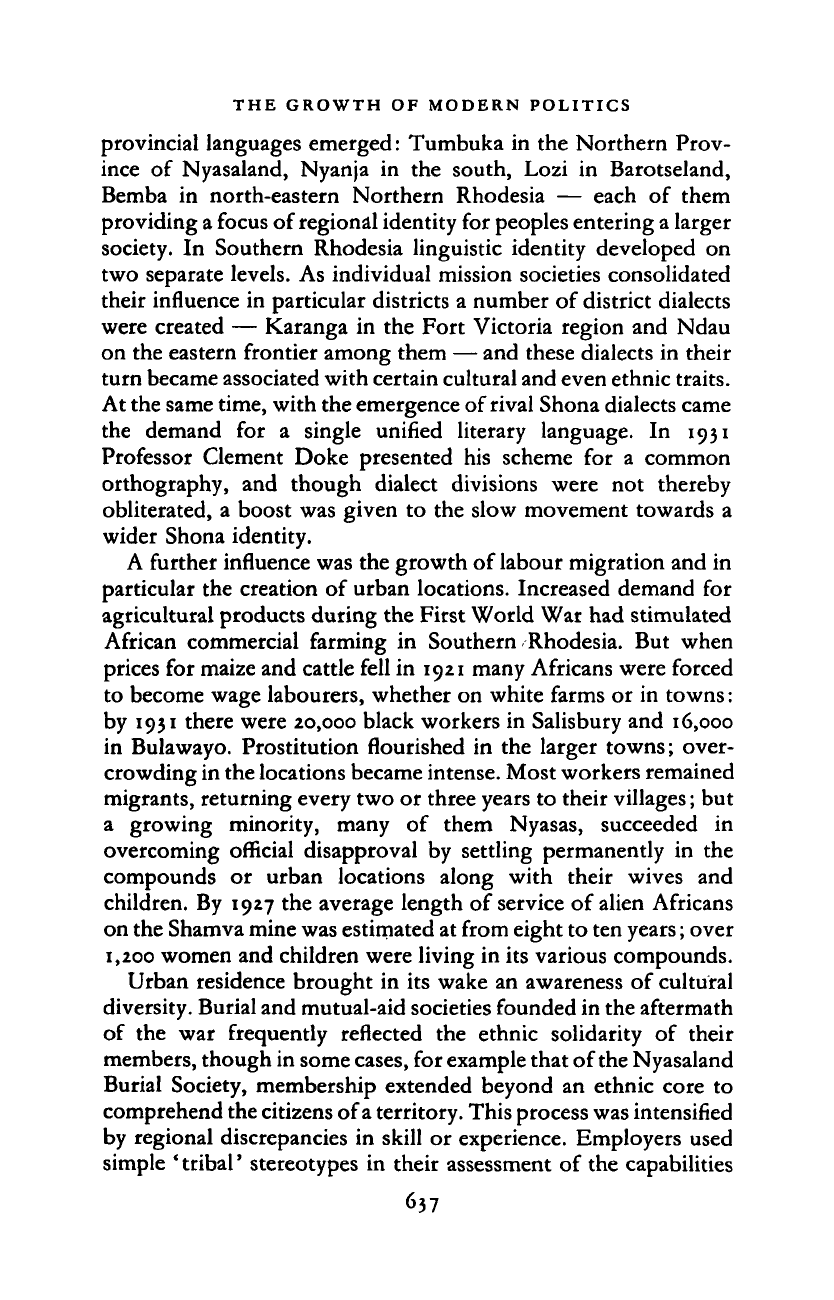
THE GROWTH OF MODERN POLITICS
provincial languages emerged: Tumbuka in the Northern Prov-
ince
of
Nyasaland, Nyanja
in the
south, Lozi
in
Barotseland,
Bemba
in
north-eastern Northern Rhodesia
—
each
of
them
providing a focus of regional identity for peoples entering a larger
society.
In
Southern Rhodesia linguistic identity developed
on
two separate levels. As individual mission societies consolidated
their influence in particular districts a number of district dialects
were created — Karanga
in
the Fort Victoria region and Ndau
on the eastern frontier among them — and these dialects in their
turn became associated with certain cultural and even ethnic traits.
At the same time, with the emergence of rival Shona dialects came
the demand
for a
single unified literary language.
In 1931
Professor Clement Doke presented his scheme
for a
common
orthography,
and
though dialect divisions were
not
thereby
obliterated,
a
boost was given to the slow movement towards
a
wider Shona identity.
A further influence was the growth of labour migration and in
particular the creation of urban locations. Increased demand for
agricultural products during the First World War had stimulated
African commercial farming
in
Southern Rhodesia. But when
prices for maize and cattle fell in 1921 many Africans were forced
to become wage labourers, whether on white farms or in towns:
by 1931 there were 20,000 black workers in Salisbury and 16,000
in Bulawayo. Prostitution flourished
in
the larger towns; over-
crowding in the locations became
intense.
Most workers remained
migrants, returning every two or three years to their villages; but
a growing minority, many
of
them Nyasas, succeeded
in
overcoming official disapproval
by
settling permanently
in the
compounds
or
urban locations along with their wives
and
children. By 1927 the average length of service of alien Africans
on the Shamva mine was estimated at from eight to ten years; over
1,200 women and children were living in its various compounds.
Urban residence brought in its wake an awareness of cultural
diversity. Burial and mutual-aid societies founded in the aftermath
of the
war
frequently reflected
the
ethnic solidarity
of
their
members, though in some
cases,
for example that of the Nyasaland
Burial Society, membership extended beyond an ethnic core
to
comprehend the citizens of
a
territory. This process was intensified
by regional discrepancies in skill or experience. Employers used
simple ' tribal' stereotypes in their assessment of the capabilities
637
Cambridge Histories Online © Cambridge University Press, 2008
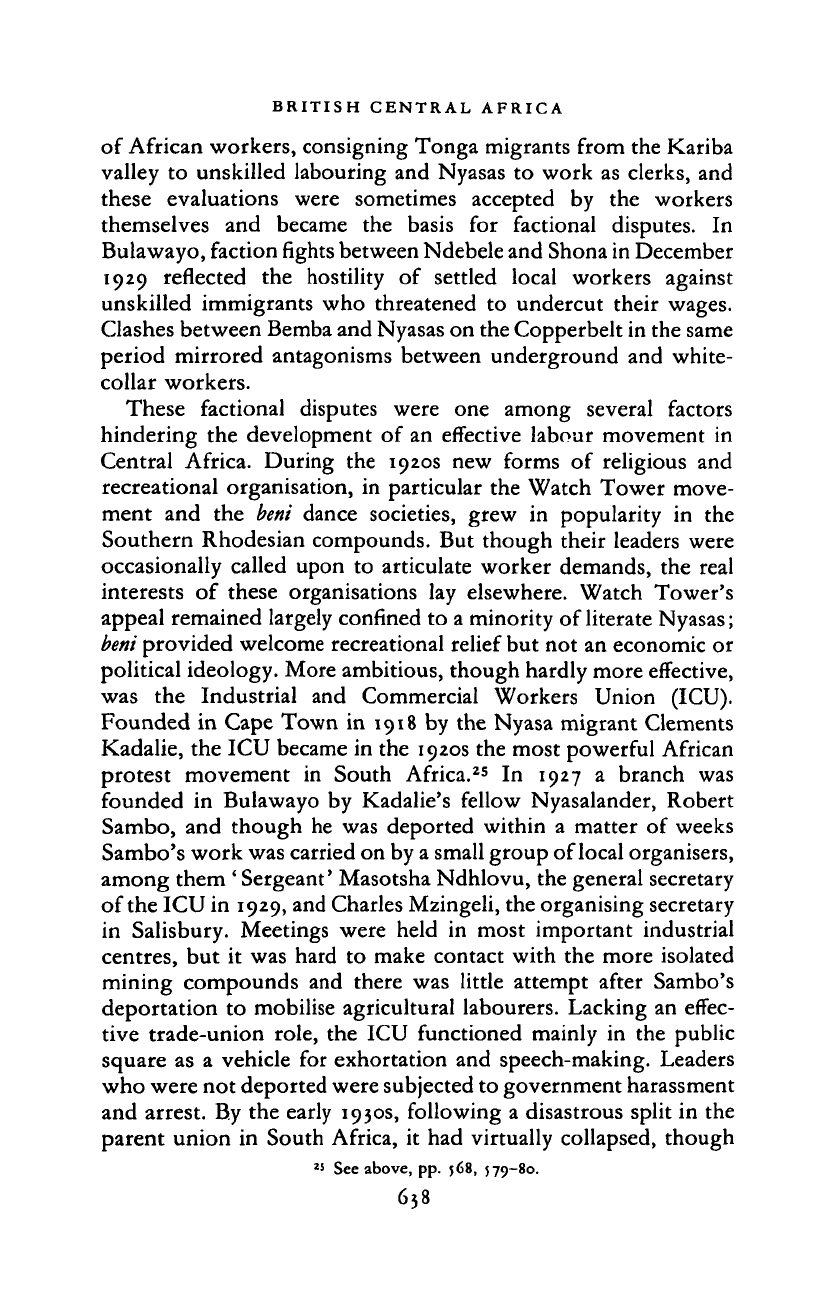
BRITISH CENTRAL AFRICA
of African workers, consigning Tonga migrants from the Kariba
valley to unskilled labouring and Nyasas to work as clerks, and
these evaluations were sometimes accepted
by the
workers
themselves
and
became
the
basis
for
factional disputes.
In
Bulawayo, faction fights between Ndebele and Shona in December
1929 reflected
the
hostility
of
settled local workers against
unskilled immigrants who threatened
to
undercut their wages.
Clashes between Bemba and Nyasas on the Copperbelt in the same
period mirrored antagonisms between underground and white-
collar workers.
These factional disputes were
one
among several factors
hindering the development of an effective labour movement
in
Central Africa. During the 1920s new forms
of
religious and
recreational organisation, in particular the Watch Tower move-
ment and
the
beni dance societies, grew
in
popularity
in the
Southern Rhodesian compounds. But though their leaders were
occasionally called upon to articulate worker demands, the real
interests
of
these organisations lay elsewhere. Watch Tower's
appeal remained largely confined to a minority of literate Nyasas;
beni
provided welcome recreational relief but not an economic or
political ideology. More ambitious, though hardly more effective,
was
the
Industrial
and
Commercial Workers Union (ICU).
Founded in Cape Town in 1918 by the Nyasa migrant Clements
Kadalie, the ICU became in the 1920s the most powerful African
protest movement
in
South Africa.
25
In
1927
a
branch
was
founded
in
Bulawayo by Kadalie's fellow Nyasalander, Robert
Sambo, and though he was deported within
a
matter of weeks
Sambo's work was carried on by a small group of local organisers,
among them
'
Sergeant' Masotsha Ndhlovu, the general secretary
of the ICU in 1929, and Charles Mzingeli, the organising secretary
in Salisbury. Meetings were held
in
most important industrial
centres, but
it
was hard to make contact with the more isolated
mining compounds and there was little attempt after Sambo's
deportation to mobilise agricultural labourers. Lacking an effec-
tive trade-union role, the ICU functioned mainly
in
the public
square as
a
vehicle for exhortation and speech-making. Leaders
who were not deported were subjected to government harassment
and arrest. By the early 1930s, following a disastrous split in the
parent union in South Africa,
it
had virtually collapsed, though
25
See above, pp. 568, 579-80.
638
Cambridge Histories Online © Cambridge University Press, 2008
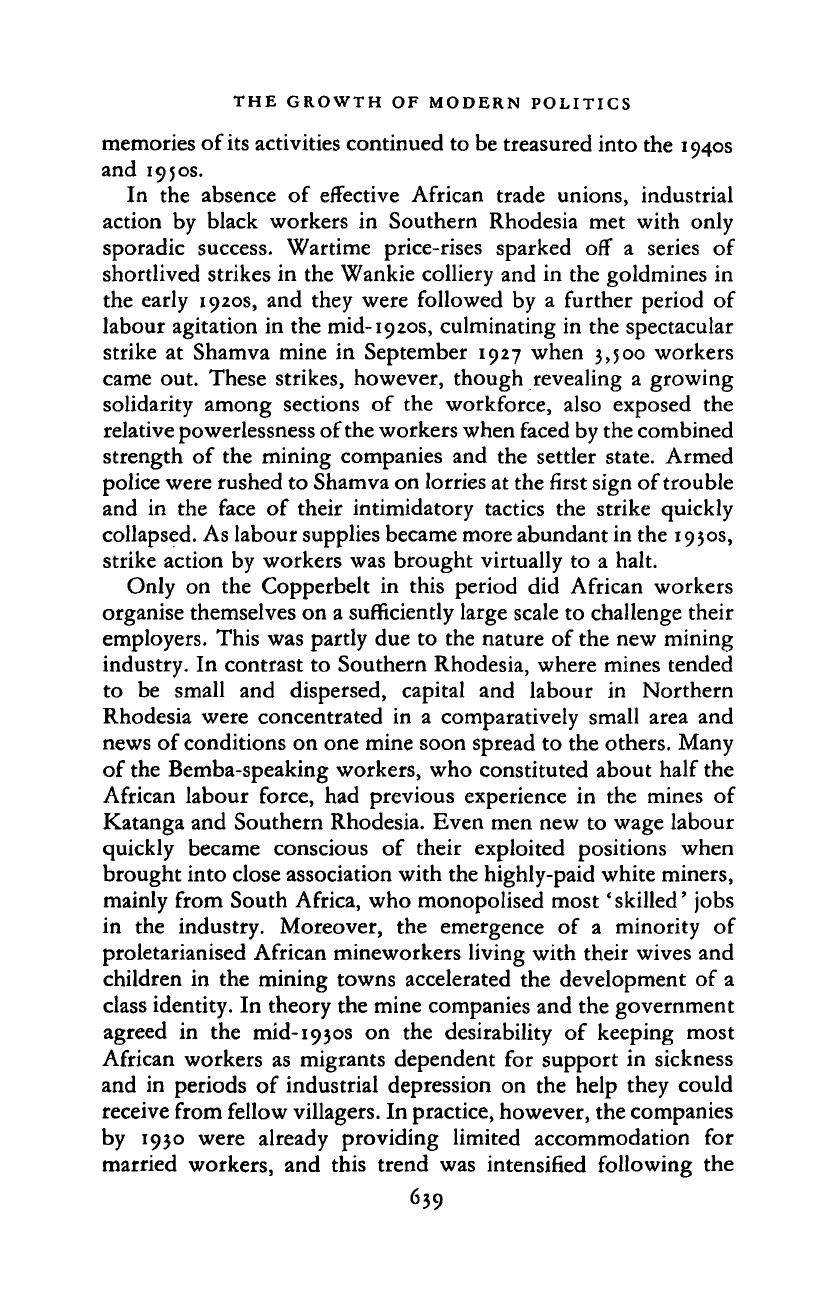
THE GROWTH OF MODERN POLITICS
memories of its activities continued to be treasured into the 1940s
and 1950s.
In the absence of effective African trade unions, industrial
action by black workers in Southern Rhodesia met with only
sporadic success. Wartime price-rises sparked off a series of
shortlived strikes in the Wankie colliery and in the goldmines in
the early 1920s, and they were followed by a further period of
labour agitation in the mid-19
20s,
culminating in the spectacular
strike at Shamva mine in September 1927 when 3,500 workers
came out. These strikes, however, though revealing a growing
solidarity among sections of the workforce, also exposed the
relative powerlessness of the workers when faced by the combined
strength of the mining companies and the settler state. Armed
police were rushed to Shamva on lorries at the first sign of trouble
and in the face of their intimidatory tactics the strike quickly
collapsed. As labour supplies became more abundant in the 1930s,
strike action by workers was brought virtually to a halt.
Only on the Copperbelt in this period did African workers
organise themselves on a sufficiently large scale to challenge their
employers. This was partly due to the nature of the new mining
industry. In contrast to Southern Rhodesia, where mines tended
to be small and dispersed, capital and labour in Northern
Rhodesia were concentrated in a comparatively small area and
news of conditions on one mine soon spread to the others. Many
of the Bemba-speaking workers, who constituted about half the
African labour force, had previous experience in the mines of
Katanga and Southern Rhodesia. Even men new to wage labour
quickly became conscious of their exploited positions when
brought into close association with the highly-paid white miners,
mainly from South Africa, who monopolised most' skilled' jobs
in the industry. Moreover, the emergence of a minority of
proletarianised African mineworkers living with their wives and
children in the mining towns accelerated the development of a
class identity. In theory the mine companies and the government
agreed in the mid-1930s on the desirability of keeping most
African workers as migrants dependent for support in sickness
and in periods of industrial depression on the help they could
receive from fellow villagers. In practice, however, the companies
by 1930 were already providing limited accommodation for
married workers, and this trend was intensified following the
639
Cambridge Histories Online © Cambridge University Press, 2008
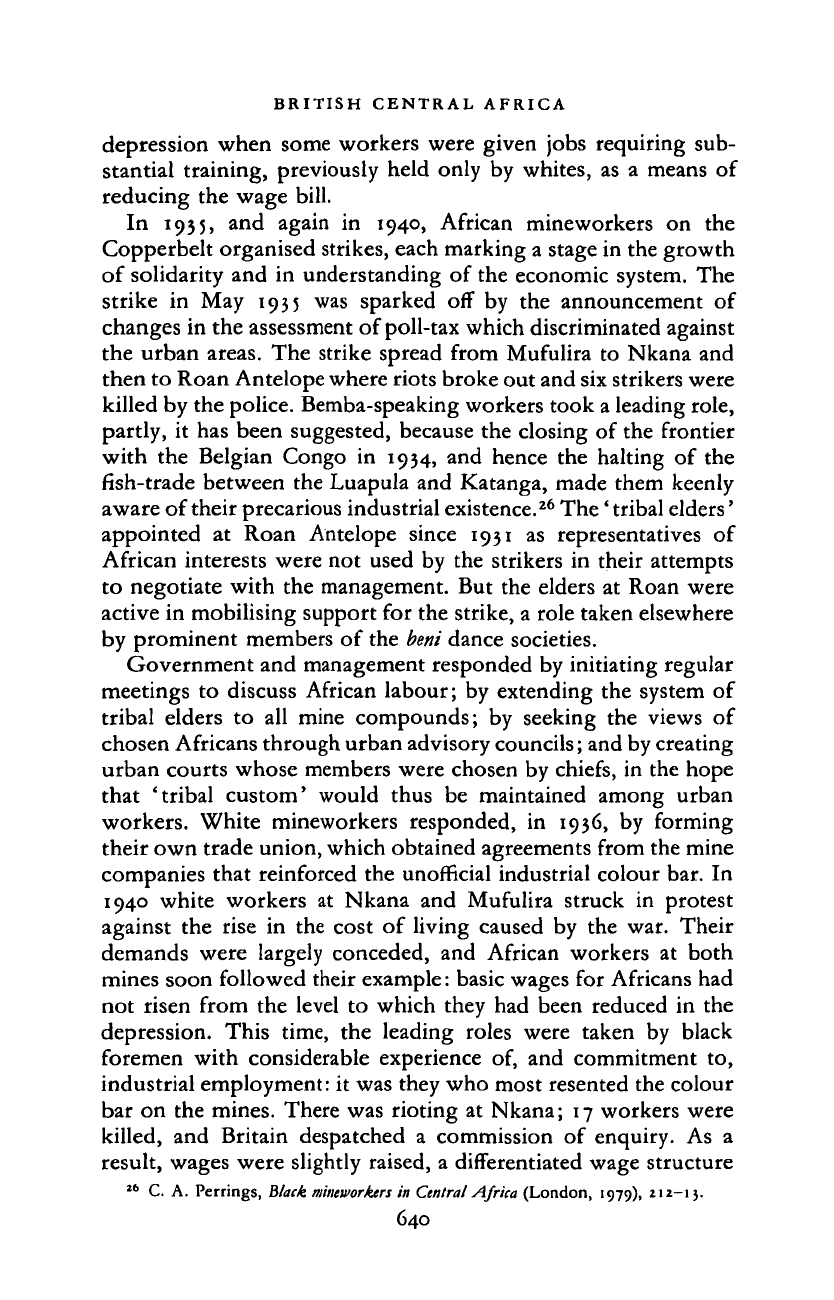
BRITISH CENTRAL AFRICA
depression when some workers were given jobs requiring sub-
stantial training, previously held only by whites, as
a
means of
reducing the wage bill.
In 1935,
and
again
in
1940, African mineworkers
on the
Copperbelt organised strikes, each marking a stage in the growth
of solidarity and in understanding of the economic system. The
strike
in
May 1935 was sparked
off
by the announcement
of
changes in the assessment of poll-tax which discriminated against
the urban areas. The strike spread from Mufulira to Nkana and
then to Roan Antelope where riots broke out and six strikers were
killed by the police. Bemba-speaking workers took a leading role,
partly,
it
has been suggested, because the closing of the frontier
with the Belgian Congo
in
1934, and hence the halting
of
the
fish-trade between the Luapula and Katanga, made them keenly
aware of their precarious industrial existence.
26
The' tribal elders'
appointed
at
Roan Antelope since 1931
as
representatives
of
African interests were not used by the strikers in their attempts
to negotiate with the management. But the elders at Roan were
active in mobilising support for the strike, a role taken elsewhere
by prominent members of the
bent
dance societies.
Government and management responded by initiating regular
meetings to discuss African labour; by extending the system of
tribal elders
to
all mine compounds;
by
seeking the views
of
chosen Africans through urban advisory councils; and by creating
urban courts whose members were chosen by chiefs, in the hope
that 'tribal custom' would thus
be
maintained among urban
workers. White mineworkers responded,
in
1936,
by
forming
their own trade union, which obtained agreements from the mine
companies that reinforced the unofficial industrial colour bar.
In
1940 white workers
at
Nkana and Mufulira struck
in
protest
against the rise
in
the cost
of
living caused by the war. Their
demands were largely conceded, and African workers
at
both
mines soon followed their example: basic wages for Africans had
not risen from the level to which they had been reduced in the
depression. This time, the leading roles were taken
by
black
foremen with considerable experience
of,
and commitment to,
industrial employment: it was they who most resented the colour
bar on the mines. There was rioting at Nkana; 17 workers were
killed, and Britain despatched
a
commission
of
enquiry. As
a
result, wages were slightly raised, a differentiated wage structure
26
C.
A.
Perrings, Black
mineworkers
in Central Africa (London, 1979), 212-13.
640
Cambridge Histories Online © Cambridge University Press, 2008
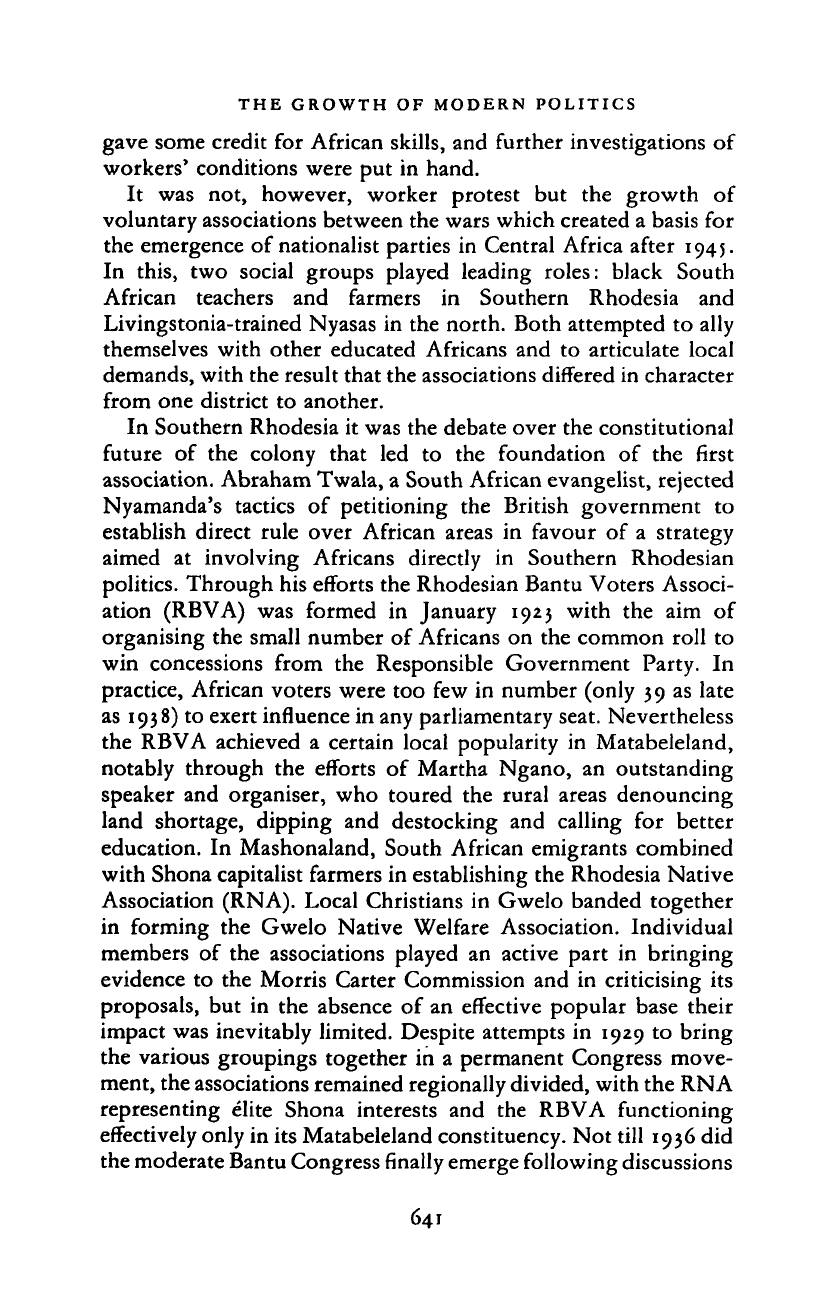
THE GROWTH OF MODERN POLITICS
gave some credit for African skills, and further investigations of
workers' conditions were put in hand.
It
was not,
however, worker protest
but the
growth
of
voluntary associations between the wars which created a basis for
the emergence of nationalist parties in Central Africa after 1945.
In this, two social groups played leading roles: black South
African teachers
and
farmers
in
Southern Rhodesia
and
Livingstonia-trained Nyasas in the north. Both attempted to ally
themselves with other educated Africans and
to
articulate local
demands, with the result that the associations differed in character
from one district to another.
In Southern Rhodesia it was the debate over the constitutional
future
of
the colony that
led to the
foundation
of the
first
association. Abraham Twala, a South African evangelist, rejected
Nyamanda's tactics
of
petitioning
the
British government
to
establish direct rule over African areas
in
favour
of
a strategy
aimed
at
involving Africans directly
in
Southern Rhodesian
politics. Through his efforts the Rhodesian Bantu Voters Associ-
ation (RBVA) was formed
in
January 1923 with
the
aim
of
organising the small number of Africans on the common roll
to
win concessions from
the
Responsible Government Party.
In
practice, African voters were too few in number (only 39 as late
as 1938) to exert influence in any parliamentary seat. Nevertheless
the RBVA achieved
a
certain local popularity
in
Matabeleland,
notably through the efforts
of
Martha Ngano,
an
outstanding
speaker and organiser, who toured the rural areas denouncing
land shortage, dipping
and
destocking
and
calling
for
better
education.
In
Mashonaland, South African emigrants combined
with Shona capitalist farmers in establishing the Rhodesia Native
Association (RNA). Local Christians in Gwelo banded together
in forming the Gwelo Native Welfare Association. Individual
members
of
the associations played
an
active part
in
bringing
evidence to the Morris Carter Commission and
in
criticising
its
proposals, but
in
the absence
of
an effective popular base their
impact was inevitably limited. Despite attempts in 1929 to bring
the various groupings together in
a
permanent Congress move-
ment, the associations remained regionally divided, with the RNA
representing elite Shona interests
and the
RBVA functioning
effectively only in its Matabeleland constituency. Not till 1936 did
the moderate Bantu Congress
finally
emerge following discussions
641
Cambridge Histories Online © Cambridge University Press, 2008
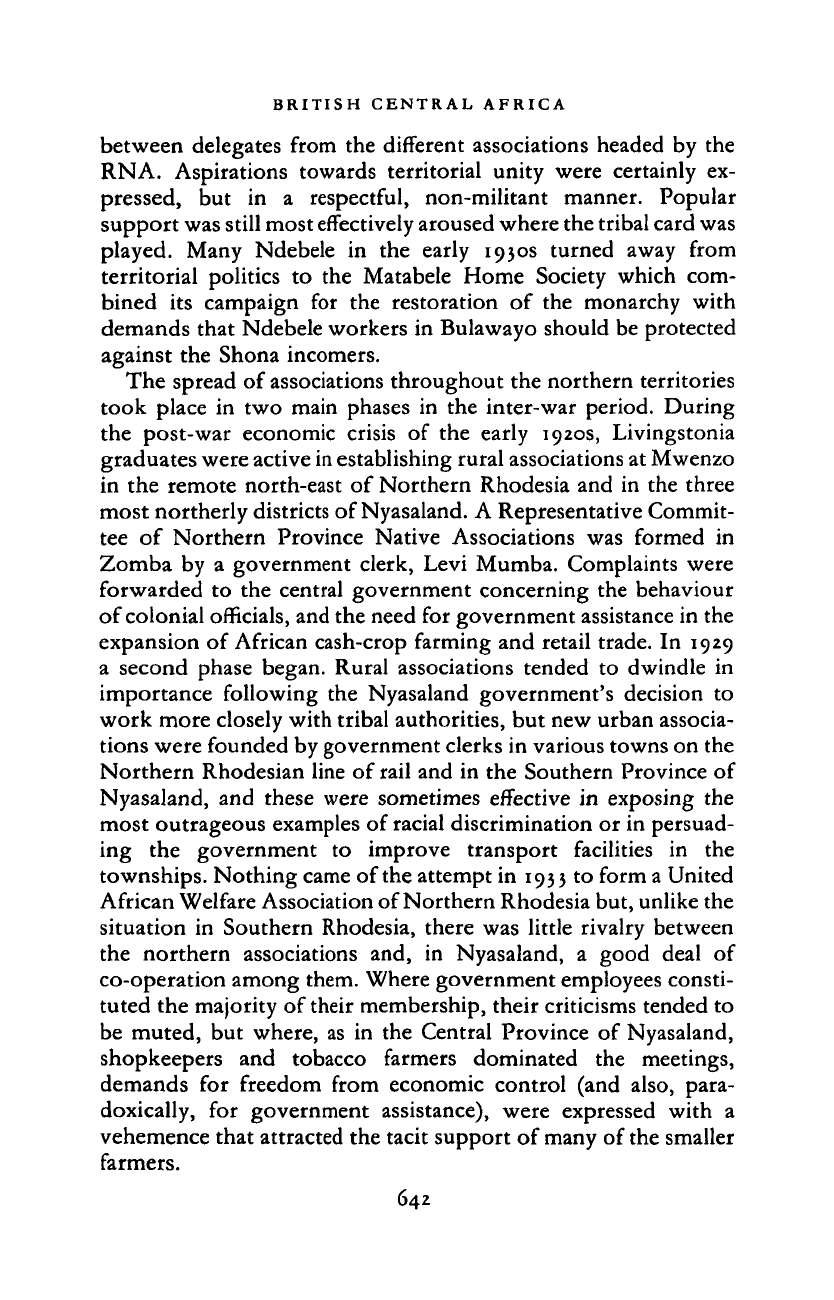
BRITISH CENTRAL AFRICA
between delegates from the different associations headed by the
RNA. Aspirations towards territorial unity were certainly ex-
pressed,
but in a
respectful, non-militant manner. Popular
support was still most effectively aroused where the tribal card was
played. Many Ndebele
in the
early 1930s turned away from
territorial politics
to
the Matabele Home Society which com-
bined
its
campaign
for
the restoration
of
the monarchy with
demands that Ndebele workers in Bulawayo should be protected
against the Shona incomers.
The spread of associations throughout the northern territories
took place
in
two main phases
in
the inter-war period. During
the post-war economic crisis
of
the early 1920s, Livingstonia
graduates were active in establishing rural associations at Mwenzo
in the remote north-east of Northern Rhodesia and in the three
most northerly districts of Nyasaland. A Representative Commit-
tee
of
Northern Province Native Associations was formed
in
Zomba by
a
government clerk, Levi Mumba. Complaints were
forwarded to the central government concerning the behaviour
of colonial officials, and the need for government assistance in the
expansion of African cash-crop farming and retail trade. In 1929
a second phase began. Rural associations tended to dwindle
in
importance following the Nyasaland government's decision
to
work more closely with tribal authorities, but new urban associa-
tions were founded by government clerks in various towns on the
Northern Rhodesian line of rail and in the Southern Province of
Nyasaland, and these were sometimes effective
in
exposing the
most outrageous examples of racial discrimination or in persuad-
ing
the
government
to
improve transport facilities
in the
townships. Nothing came of the attempt in 1933 to form a United
African Welfare Association of Northern Rhodesia but, unlike the
situation
in
Southern Rhodesia, there was little rivalry between
the northern associations and,
in
Nyasaland,
a
good deal
of
co-operation among them. Where government employees consti-
tuted the majority of their membership, their criticisms tended to
be muted, but where, as
in
the Central Province of Nyasaland,
shopkeepers
and
tobacco farmers dominated
the
meetings,
demands
for
freedom from economic control (and also, para-
doxically,
for
government assistance), were expressed with
a
vehemence that attracted the tacit support of many of the smaller
farmers.
642
Cambridge Histories Online © Cambridge University Press, 2008
